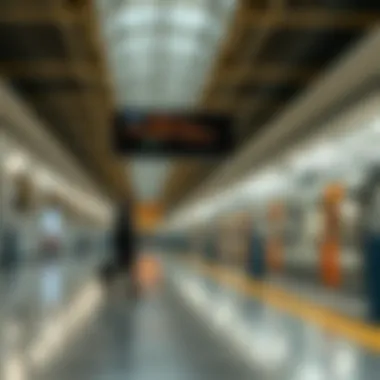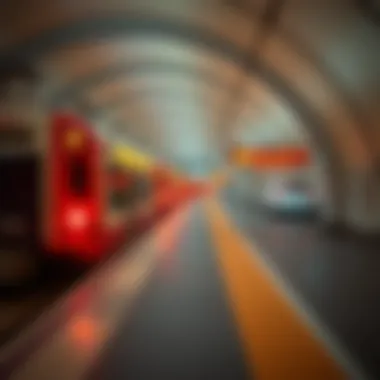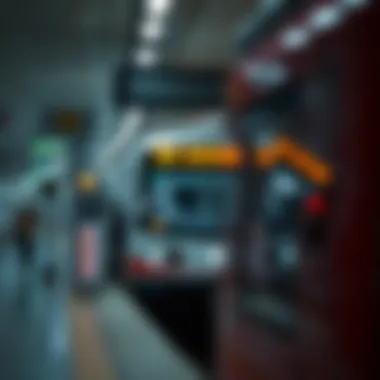Comprehensive Guide to Sunday Metro Timings in Dubai


Intro
Navigating the vibrant city of Dubai on a Sunday can feel daunting, especially for newcomers and tourists. The metro system serves as a lifeline, providing efficient and cost-effective transportation across this sprawling urban landscape. Understanding the metro timings specifically on Sundays is crucial, as they can differ from the hustle and bustle of weekdays. This guide aims to unravel the complexities of the Dubai Metro schedule, empowering residents and visitors alike to seamlessly integrate public transport into their travel plans.
As Dubai continues to grow and expand, its public transport network, particularly the metro, has become a model for accessibility and convenience. Knowing what time trains leave and arrive, especially on a Sunday, can greatly influence one’s travel experience. Let's delve deeper into the current metro timings, the factors that affect these schedules, and how they play a pivotal role in enhancing public transport accessibility in this lively metropolis.
Whether you’re commuting for work, exploring attractions, or heading to meet friends, being equipped with the right information can make all the difference.
Prelims to Dubai's Metro System
Understanding the framework of Dubai's metro system is essential for anyone looking to navigate the city seamlessly. With its innovative infrastructure and efficiency, Dubai Metro has transformed the way residents and visitors commute. Not only does the metro reduce travel time, but it also encourages a sustainable form of transport amid a rapidly urbanizing landscape. In this article, we'll delve into the nuances of metro timings specifically on Sundays, aimed at providing clarity and insight into how this system operates.
Brief History of the Dubai Metro
The inception of the Dubai Metro dates back to a vision proposed in the late 1990s. The project's goal was straightforward yet ambitious: provide a reliable, efficient means of public transport that could cater to a burgeoning population and an influx of tourists. Construction began in 2006, and just under four years later, the metro officially opened in 2009. From the outset, the Dubai Metro was designed to alleviate traffic congestion, common in rapidly expanding cities. Its development signals not just a leap in transportation technology but also mirrors Dubai's broader ambition to enhance quality of life through urban planning initiatives.
Importance of Public Transport in Dubai
In a city where the car is king, public transport holds invaluable significance. Dubai's public transportation network, with the metro at its core, plays a crucial role in the daily lives of many. It serves not only the local populace but also expats and tourists alike. Consider these points:
- Accessibility: The metro connects vital regions of the city, making it easier for various demographics to travel without the hassle of parking or traffic.
- Cost-Effective: Metro rides offer an affordable alternative to taxis or ride-sharing services.
- Environmental Considerations: Implementing an effective public transport system contributes to reducing the carbon footprint, an increasingly important factor in urban settings.
Attending to such aspects enhances not just the transport experience but integrates the users better into the broader framework of Dubai's dynamic society. As we move forward, understanding the specific timings of the metro, particularly on Sundays, will assist in planning efficient outings, whether for work or leisure.
Operating Hours of Dubai Metro on Sundays
Understanding the operating hours of the Dubai Metro on Sundays is crucial for anyone who relies on public transportation. The metro is a lifeline for commuters, connecting key areas in the city and offering a swift alternative to driving. Knowledge of the specific timings can greatly affect travel plans, influence arrival times, and ensure a smoother journey overall. Here, we detail the standard operating hours, alongside how these timings may differ on weekends and public holidays.
Standard Operating Times
On Sundays, the Dubai Metro operates from 8:00 AM to 12:00 AM, midnight. This schedule allows ample opportunity for both residents and tourists to navigate the city, whether for leisure or essential errands. The Metro consists of two main lines, the Red Line and the Green Line. Trains on the Red Line usually run with a frequency of about 10 minutes during peak hours, but on Sundays, the intervals may extend a bit longer compared to weekdays.
It’s worth noting that the morning rush, which typically encompasses the hours between 7:00 AM and 9:00 AM, attracts a significant influx of riders. While the metro does cater to this demand, understanding these standard times can help travelers avoid congestion during peak hours.
Differences in Timing on Weekends
The operating hours of the Dubai Metro experience some shifts on weekends, notably Friday and Saturday, which can impact Sunday travel schedules. On Fridays, the Metro starts operations later in the day, beginning at 10:00 AM and continuing until 1:00 AM the following day. This Friday delay is primarily due to the Islamic day of prayer. By Saturday, normal service resumes with operating hours similar to that of Sundays. Consequently, as many people wrap up their weekend activities on Sundays, the Metro service essentially accommodates late risers and those who dine out late.


Waking up late, not feeling the push to spring out of bed on a Sunday? You're certainly not alone. Another point to remember is how that can affect your choice of transport. If you're a night owl transitioning into Monday, checking next-day schedules is prudent too. Factors like these should be considered to fine-tune one's travel plans seamlessly.
“Public transport isn’t just about getting from point A to point B; it’s about connecting lives, stories, and destinations.”
Factors Affecting Sunday Metro Timings
Understanding the factors that impact the metro timings on Sundays in Dubai is crucial for anyone looking to navigate the city efficiently. As the metro system is a lifeline for many residents and visitors alike, knowing when and how service can vary allows for better planning and reduced travel frustration.
Seasonal Variations
Seasonality plays a significant role in the operation of public transit systems, including Dubai's metro. The summer months, for instance, can see alterations in service, driven primarily by lower passenger volumes due to the intense heat. It’s a well-known fact that few people wish to venture outside during blistering conditions, thereby affecting commuter patterns. Conversely, during cooler months, particularly from October to April, public interest in various events and festivals tends to increase ridership. Visitors flock to the city, sometimes translating into longer waiting times and packed carriages. The fluctuations in passenger numbers during these seasonal peaks and troughs can prompt adjustments to operational hours, allowing for more frequent service during busy periods and reduced hours when demand dwindles.
Public Holidays and Their Impact
Public holidays undoubtedly influence metro timings and schedules in Dubai. When the city celebrates events such as Eid Al Fitr or national events like UAE National Day, the metro system usually operates on special hours to accommodate higher traveler demand. On holidays, parks, malls, and cultural sites become bustling hubs, with the metro acting as the primary mode of transport. This influx of passengers can lead to adjustments in service frequency, ensuring that everyone can access events without too much hassle. Travel planning around these date-specific alterations is vital, as users might encounter unexpected delays or the need to adjust their travel times in accordance with the modified schedules. Checking the latest updates during holiday seasons becomes not just a suggestion, but a necessity.
Maintenance Considerations
Regular maintenance is yet another aspect that influences metro timings on Sundays. Metro systems need constant upkeep to ensure the safety and performance of trains, tracks, and other infrastructure. When maintenance is scheduled, it can lead to partial service suspensions or altered operating hours. These maintenance operations often get planned during low-demand periods such as Sundays, aiming to minimize disruption for commuters. However, travelers should be wary that unexpected maintenance can also arise in response to operational challenges, such as malfunctioning equipment or safety concerns. Hence, it is always a good idea for passengers to check for real-time updates or alerts before embarking on their journey, ensuring they’re not caught off guard by sudden changes to the metro schedule.
Planning Activities Around Metro Timings
When it comes to navigating a bustling city like Dubai, understanding the metro timings is crucial for anyone looking to optimize their travel experiences. Planning activities around these timings not only saves time but also enhances the overall enjoyment of your day. Whether you're a resident or a visitor, knowing the ins and outs of the Dubai Metro on a Sunday can make a significant difference in your plans.
Specific Elements and Benefits
One of the most significant advantages of planning activities in alignment with metro timings is the efficiency it brings. Dubai's metro system offers a great way to traverse the city quickly and affordably. For instance, during weekends, the service runs on a slightly different schedule compared to weekdays. By familiarizing yourself with these operational hours, you can better align your itinerary.
There's also the matter of optimal enjoyment. For instance, if you intend to visit the famous Dubai Mall or take a stroll down Jumeirah Beach, knowing the peak hours of metro services can help you decide when to hit the road. Missing the rush can transform your experience, allowing you to stroll leisurely instead of sandwiched between commuters.
- Convenience: Time-saving is essential, especially in a city where activities abound.
- Informed Decisions: Having a clear plan lets you decide when and where to go based on metro availability.
- Less Stress: Avoiding crowded trains means a more pleasant journey.
Considerations About Metro Timings
When planning around metro timings, consider seasonal variations as well as possible changes such as public holidays. For instance, during the Ramadan season, the metro may run extended or altered hours. Likewise, on occasions like UAE National Day, special services might be implemented, enhancing the frequency. It could be a good idea to keep an eye on local announcements and updates that might affect your travel.
Another aspect to think about is the maintenance schedules. Metro maintenance can occasionally lead to unexpected delays or altered routes. For proper planning, make checks on both the Dubai Metro's official site and local news sources, such as Dubai Media Office (www.dubai.media).
"A little planning goes a long way! Aligning your travel with metro timings ensures you maximize your day in Dubai."
In short, planning your activities to sync with the metro's operating hours can significantly enhance your overall experience in Dubai. It leads to not just efficiency but also a more enjoyable travel experience through and around this remarkable city.
Best Times to Travel on Sundays


Sundays in Dubai can have a unique rhythm, especially when it comes to the metro schedule. Understanding the best times to travel on this day allows you to make the most out of your journey. Typically, early mornings and late afternoons are when the metro might have the least congestion. If you're aiming for a leisurely brunch or a stroll at the beach, catching the metro right after it opens could give you a quieter ride.
Moreover, traveling during off-peak hours can often lead to a more enjoyable experience. Ideally, consider:
- Before 9 AM: Before the workday gets buzzing can be a goldmine for quiet travel.
- Around mid-afternoon: After lunch till about 5 PM often sees fewer passengers.
- Evenings after 8 PM: The crowds start to thin out as the day winds down.
Strategies for Avoiding Crowds
To make your Sunday travel experience as smooth as possible, adopting strategies to avoid crowds is essential. First off, plan your travel times by checking the recent reports on crowd levels at various stations. Knowing which stations attract larger groups can really make a difference. For instance, stations like Dubai Mall and Burj Khalifa can become quite packed, especially during weekends.
Another effective strategy comprises using the metro's different classes. The first class provides more space and a more peaceful environment, while the standard class fills up quickly. If your budget allows, it could be worth it to opt for a first-class ticket during peak hours.
Consider also traveling with a small group rather than a large one if you can. Not only is it easier to navigate through the metro, but it also makes finding seats much simpler.
- Leverage Off-Peak Times: Traveling just before standard work hours can relieve you from the rush.
- Use Alternative Stations: If your final destination is known to fill up quickly, consider alighting at a less crowded station and walking.
- Stay Informed: Regularly check local forums or websites for updates from other travelers or official announcements.
With the right strategies in place, planning your activities around metro timings ensures a seamless experience in the city, making it one to reflect on positively.
Tech Tools for Tracking Metro Timings
In today's fast-paced world, having access to accurate information is crucial, especially when it comes to public transport. For those navigating the bustling city of Dubai, utilizing tech tools for tracking metro timings can enhance travel convenience and efficiency. With the city's extensive network, it's essential for all users—homebuyers, expatriates, investors, property managers—to have reliable tools that inform them of real-time updates regarding metro schedules.
These tech tools not only aid in planning trips but also help avoid unexpected delays. A missed connection or a prolonged wait could mean the difference between reaching a destination on time or being late. The integration of technology in transport services offers a lifeline, allowing users to pull information directly to their mobile devices or computers.
Mobile Apps and Their Features
Using mobile applications for metro timings can be particularly beneficial for those in a hurry or unfamiliar with the city. Many applications come equipped with features designed specifically for public transport users, including:
- Real-time tracking: Users can view the exact location of metro trains, making it easier to estimate arrival times and avoid long waits.
- Customizable alerts: Setting up notifications for specific routes can help individuals stay on top of any changes in service or delays.
- Route planning: Enhanced features offer assistance in planning trips—showing the best options based on current timetables, including transfers between metro lines.
- User reviews: Many apps provide a community where users can share their experiences, keeping the information fresh and relevant.
Popular mobile apps trusted by commuters include the RTA Dubai app, which allows commuters to access metro timings, purchase tickets, and even plan multi-modal journeys seamlessly.
Website Resources for Real-Time Updates
Beyond mobile apps, various websites serve as valuable resources for commuters seeking the latest metro information. Websites dedicated to public transport, such as the Dubai Roads and Transport Authority (RTA) at rta.ae, offer comprehensive details that can assist travelers in crafting their journeys.
Key features often found on these sites include:
- Interactive maps: Users can explore the entire metro network visually, helping to identify closest stations and connections.
- Operational schedules: A clear overview of daily metro operating hours is provided, with sections dedicated to different days of the week.
- Maintenance alerts: Websites often publish upcoming maintenance schedules, allowing users to plan their travel accordingly.
- FAQs and support sections: These provide additional assistance for new users unfamiliar with the metro system, guiding them through possible inquiries.


In summary, leveraging tech tools such as mobile apps and website resources can significantly alleviate the stress of navigating Sunday metro timings in Dubai. With the right information at one’s fingertips, users can enjoy smoother travel experiences, minimize frustrations, and embrace the vibrant life of this dynamic city.
The Broader Context of Public Transportation in Dubai
Public transportation is crucial for any thriving metropolis, and Dubai is no exception. The integration of various modes of transport plays a significant role in the daily life of both residents and visitors alike. This section delves into the relevance of public transportation in Dubai, demonstrating how the metro system fits within the broader transport ecosystem.
Integration with Other Transport Modes
In Dubai, the metro system connects seamlessly with other transport options, creating a comprehensive network for ease of travel. Notably, the metro chiefly interfaces with the bus systems, taxis, and ride-sharing services, allowing for a smooth transition from one mode to another. Passengers can easily switch between buses and the metro without excessive delays.
- Metro Stations Near Bus Stations: Many metro stations are strategically placed near bus terminals. This placement minimizes wait times and encourages multimodal transport usage. Here’s a closer look at a couple of key stations:
- Union Station: This hub is a classic example, providing direct access to buses that service various parts of the city.
- Burjuman Station: Another key interchange, linking riders to numerous bus routes, making commutes easier.
Additionally, taxis are readily available outside metro stations, making it a doddle to continue traveling even when the metro does not cover a particular area. Moreover, ride-hailing platforms like Uber and Careem are complementary to the metro system, filling the gaps where public transport may not reach. This coherence in transportation provides a holistic travel experience in a bustling city like Dubai.
“The efficiency of a city’s transport system can make or break its urban fabric, and in Dubai, the metro's integration is a testament to this philosophy.”
Future Developments and Improvements
As Dubai continues to expand, so too does its commitment to improving public transportation. Future enhancements to metro services include potential increased frequency of trains, extended operating hours during peak seasons, and further integration with smart city features.
The UAE government is constantly exploring innovative technologies to enhance commuters' experiences. Here’s a look at some expected future developments:
- Expansion of Metro Lines: Plans are already in the pipeline to extend existing lines, reaching new neighborhoods and suburban areas.
- Smart Ticketing Systems: An upgrade to the current fare system is anticipated, possibly integrating contactless payments and mobile apps for seamless travel.
- Sustainability Initiatives: With a growing focus on sustainability, the metro system aims to incorporate greener technologies, including energy-efficient trains and solar-powered stations.
These improvements not only bolster the efficiency of the metro system but also solidify its role as a centerpiece of daily life in Dubai—for both residents and visitors. Enhancing public transport does not just mean upgrading infrastructure, but fostering a culture of shared mobility, where people rely on sustainable transport for their daily commutes. In essence, these developments aim to make Dubai a model city for public transportation worldwide.
Ending: Navigating Metro Timings for Optimal Travel
Navigating the Dubai Metro on Sundays can be a real game-changer for both residents and tourists. Understanding the metro's scheduling is not just about knowing when the trains run; it’s about optimizing your travel experience in this vibrant city. Efficient travel planning can save time and enhance convenience, allowing one to fully embrace what Dubai has to offer.
The significance of this section lies in encouraging a strategic approach to planning your journeys. The knowledge of when the metro is less crowded, how maintenance or seasonal changes might influence timings, and how to best integrate this public transport option into a broader travel plan can transform a routine commute into a seamless part of one’s day. It’s important to have this comprehensive understanding to avoid surprises that could derail your plans.
Recap of Key Points
To summarize, here are some critical highlights you should keep in mind:
- Standard operating hours on Sundays generally start from early morning until midnight.
- Adjustments occur during public holidays or due to maintenance work, which is crucial to track.
- Utilizing apps and online resources can provide real-time updates, ensuring you're always informed.
- Planning around peak hours can help in avoiding crowded trains, making for a more pleasant journey.
- Linking metro travel with other transport options enhances accessibility to various parts of the city.
Encouragement for Strategic Travel Planning
Traveling smartly in Dubai is as much about mindful planning as it is about knowing the system. It’s advisable to always check the latest metro timings before heading out. Here are a few strategies to maximize your travel:
- Set alerts for any travel updates through metro apps or websites. They often provide notifications on changes that could affect your journey.
- Consider the time of day you plan to travel. Early mornings or late evenings may offer less congestion compared to mid-day.
- Keep an ear to the ground with community resources such as Reddit forums, where locals share their insights regarding transport.
- Review seasonal events or holidays noted on governmental websites like Dubai Government, as they might influence schedules.



